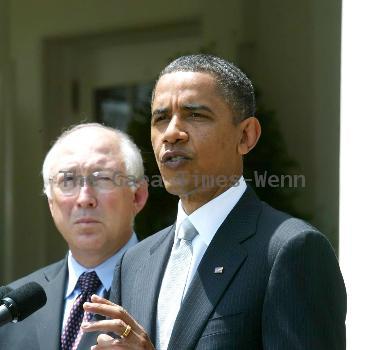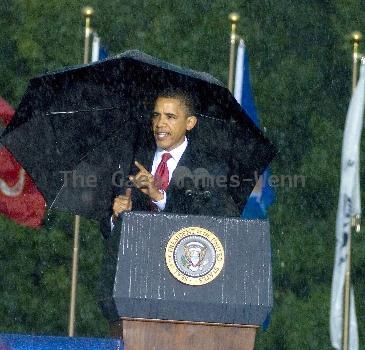Catholic Church says Cuba agrees to free 52 political prisoners, nearly a third of all held
By Will Weissert, APThursday, July 8, 2010
Church: Cuba agrees to free 52 political prisoners
HAVANA — Cuba has promised the Roman Catholic Church it will free 52 political prisoners, slashing the number held by nearly a third in what would be the communist-led island’s largest release of dissidents since Pope John Paul II visited in 1998.
Five are to be released initially and sent into exile in Spain, while the others would be freed over the next three or four months, said Havana’s archbishop, Cardinal Jaime Ortega.
The deal was announced Wednesday following a meeting between President Raul Castro and Ortega, with Spanish Foreign Minister Miguel Angel Moratinos also on hand.
“This opens a new era in Cuba with hope of putting aside differences once and for all on matters of prisoners,” the Spanish Embassy declared in a statement.
In Washington, U.S. Secretary of State Hillary Rodham Clinton also said welcomed the reported agreement.
“We think that’s a positive sign,” she said. “It’s something that is overdue but nevertheless very welcome.”
She did not say, however, if it would be enough for a new beginning to U.S.-Cuban relations. President Barack Obama’s administration has said it hoped to see an improvement in Cuba’s human rights record before easing America’s 48-year-old trade embargo against the island.
Moratinos and Ortega said they weren’t sure how long it would take for the first five prisoners to be released, but that the process would likely take days.
Returning to Madrid, Moratinos said his county was willing to accept all 52 ex-prisoners once they have been released, but so far has formally agreed to take the first five. They will not be obligated to stay in his country.
Returning to Madrid, Moratinos said his county was willing to accept all 52 ex-prisoners, but so far has formally agreed to take the first five. They will not be obligated to stay in his country.
Asked if subsequent groups of freed political prisoners also would be forced into exile, Cardinal Ortega said only that leaving Cuba “is a proposal” they will be offered.
Moratinos told Spanish media the deal could spur the EU to alter its Common Position on Cuba, which dates from 1996 and calls for advances on human rights and democracy before relations with the island can be normalized.
“I think there is no reason to maintain the common position,” Moratinos was quoted as saying. The EU is to review its relations with Cuba in September.
Back in Cuba, meanwhile, human rights and opposition activists called the scope of the agreement a surprise.
“We were hoping for a significant release of prisoners, but not this,” said Elizardo Sanchez, head of the independent Cuban Commission on Human Rights and National Reconciliation.
Those listed for release were all among 75 political opposition activists, community organizers and independent journalists rounded up in a crackdown on dissent in March 2003.
“I’m so excited,” said Laura Pollan, whose husband, Hector Maceda, was one of the 75 and has been serving 20 years in prison for treason.
She also said she feared the government might not follow through.
“I don’t think they will let everyone go; I think only some will be,” she said in her shabby living room in crumbling central Havana. “It won’t be the first time that they lie.”
Some of the 75 original prisoners had previously been freed for health reasons or after completing their terms, or were allowed into exile in Spain. But 52 have remained behind bars — most serving lengthy prison terms on charges of conspiring with Washington to destabilize Cuba’s political system. All are now seemingly poised to go free.
Ortega refused to divulge which five prisoners would be released first, or how they were chosen.
Sanchez said forced exile is not the same as unconditional freedom and said Wednesday’s agreement means “opening the prisons a little, and not to everyone.”
“These liberations will not mean a significant improvement in the terrible situation of human rights that exists in Cuba,” said Sanchez, whose Havana-based commission is not recognized — but is largely tolerated — by a government that officially brooks no organized opposition.
Still, according to a report released this week by Sanchez’s group, the number of Cuban political prisoners has fallen to 167, the lowest total since Fidel Castro took power on New Year’s Day 1959.
If the agreement holds, that number would drop by nearly another third.
It would also be the largest group of political prisoners freed since the government released 299 inmates in an amnesty following the pope’s visit 12 years ago. Of those, about 100 were considered held for political reasons.
“This is joyful news for the prisoners and their families, a credit to the Cuban Catholic Church,” said Sarah Stephens, head of the Washington-based Center for Democracy in the Americas, which supports lifting the United States’ 48-year-old trade embargo against the island.
But U.S. Rep. Ileana Ros-Lehtinen, a Florida Republican and Cuban-American, dismissed the prisoner release as a ploy.
“We must not be fooled,” she said in a statement. “Until all political prisoners are liberated, all political parties, labor unions, independent media are legalized and allowed to operate freely … maximum pressure must be exerted on the Cuban tyranny.”
Cuba’s Catholic Church recently has played an increasing role in dealing with the government for improved treatment of dissidents. Ortega helped negotiate an end to a ban on marches by Pollan’s Ladies in White and later and later won a government agreement to improve treatment of political prisoners.
The church’s increasing role helped to defuse a human rights situation that has been tense since hunger striker Orlando Zapata Tamayo died in prison on Feb. 23, rousing international sympathy for Cuban opposition figures.
Fidel Castro said Cuba held 15,000 political prisoners in 1964, but officials in recent years say none of their prisoners are held for political reasons — all for common crimes or for being paid “mercenaries” of U.S.-funded groups trying to overthrow Cuba’s government.
Associated Press Writer Ciaran Giles contributed to this report from Madrid.
Tags: Barack Obama, Caribbean, Cuba, Europe, Foreign Policy, Havana, Latin America And Caribbean, North America, Political Activism, Political Issues, Protests And Demonstrations, Religious Issues, Spain, United States, Western Europe



